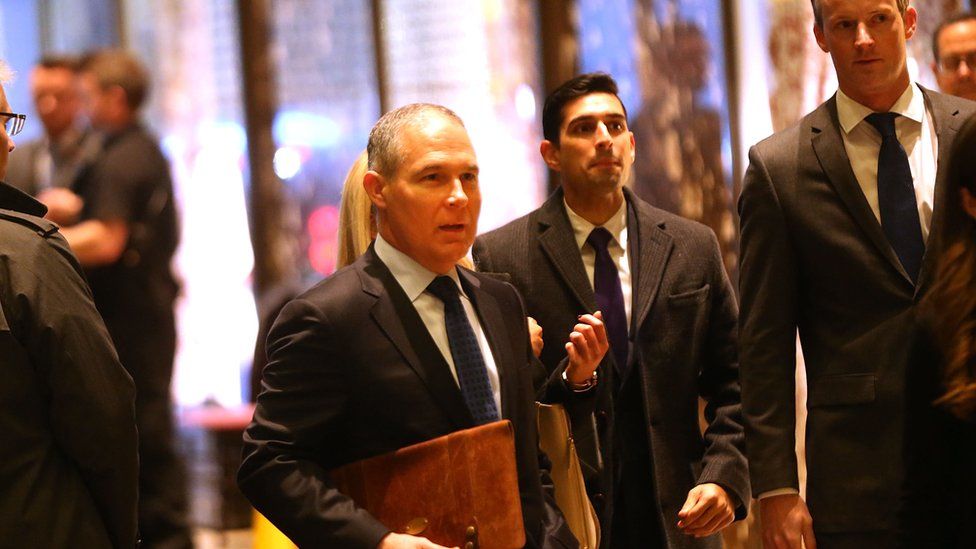Trump nominee to rekindle climate battle?
- Published

The nomination of Oklahoma attorney general Scott Pruitt to be the next head of the US Environmental Protection Agency (EPA) has two important ramifications.
The first is a clear signal from the incoming Trump administration that environmental regulations, especially as they apply to the production of energy, are set for fundamental reform.
The second implication of Mr Pruitt's nomination is that the Trump camp is not willing to accept that many aspects of the science of climate change are now settled.
Leading the charge
In his official biography Mr Pruitt revels in his role as a "leading advocate against the EPA's activist agenda".
Elected as attorney general of Oklahoma in 2010, Mr Pruitt has engaged in a legal fight with the Federal government on a number of issues including Obamacare. But it is in fighting the EPA and President Obama's climate regulations that he has really made an impact.
As the chief law officer of a major energy producing state, Mr Pruitt has taken a lead role in the 28-state challenge to the President's Clean Power Plan.
He has also secured an injunction blocking EPA's "Waters of the US" rule, which expands the scope of the Clean Water Act.
"He understands the regulatory stranglehold that the EPA has had on industry during the Obama administration," Harold Hamm, a top energy adviser to Mr Trump, told the Wall Street Journal.
"I believe that he will work to unleash prosperity in America through the proper use of regulations and adhering to the rule of law," said Mr Hamm, who is an ally of Mr Pruitt, and also CEO of Continental Resources, a major independent oil producer.
Republican politicians also welcomed the move.
"Pruitt is excellent choice for EPA," said Texas governor Greg Abbott via Twitter.
"He & I teamed up on many lawsuits against the EPA. He'll bring needed change."
The appointment though has sent shivers through the environmental community, many of whom believe it is akin to putting the fox in charge of the hen house.
Sam Adams from the World Resources Institute said it raised "some deeply troubling questions".
"Americans depend on EPA to promote human health and protect families and future generations. Its ability to protect air, water, and the climate for all people must continue," he said in a statement.
Mr Pruitt is sure to face a tricky nomination process. Much will be made of his links to oil and gas companies. He has had funding from the political-action committee of Charles and David Koch and from Devon Energy, another Oklahoma based oil and gas company.
The relationship with Devon Energy backfired somewhat when the New York Times revealed in 2014 that Mr Pruitt had sent letters of complaint to the EPA that were actually written by Devon's lawyers.
Climate disagreement
What gives environmentalists greater concern, though, are Mr Pruitt's views on climate change.
Writing in the National Review earlier this year, Mr Pruitt made it clear that he does not accept the widely held scientific views about the scale of temperature rises that are being caused by human emissions of carbon dioxide and that the impacts of this warming will be devastating for many parts of the world.
"That debate is far from settled. Scientists continue to disagree about the degree and extent of global warming and its connection to the actions of mankind," he wrote.
"That debate should be encouraged - in classrooms, public forums, and the halls of Congress. It should not be silenced with threats of prosecution. Dissent is not a crime."
Senior scientists say the evidence on the causes of climate change and the human role in them is very clear.
"Can we detect and attribute a signal in the warming that we observe that is connected to CO2 emissions and concentrations, then yes the science is settled to a very high extent," said Prof Arthur Petersen, from UCL, and a former chief scientist with the Netherlands Environmental Assessment Agency.
"If the question is the global average temperature and its causes - yes, it is settled beyond any reasonable doubt."
But researchers do acknowledge that there are several outstanding questions on the amount of carbon that can be emitted in the future and the likely response of the climate system to those emissions.
"Aspects of the debate are far from settled - if you ask me how much carbon can we afford to dump in the atmosphere and keep temperatures well below two degrees, I would say there is an uncertainty in that number of a factor of three," Prof Myles Allen from the University of Oxford, told BBC News.
He says that he believes the Trump administration is being "smart", and cautions researchers against engaging in a battle over fundamental issues. The legitimate argument, he says, is about how much climate change we as a world are prepared to accept and what we do to limit it.
"Part of that is how much do we care about small island states versus the interests of American industry? These are ethical and political questions," he said.
"If the Trump administration wants to come out and say we are good with four degrees (of warming), they should open that argument.
"If on the the other hand they agree with the Paris goal of stabilising temps well below two degrees, and nothing they've said suggests they disagree with that goal, they just think it will be easier than many people fear - then we can have very different conversations, which are about how we achieve that."